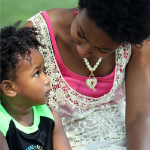Parenting | Talking to your daughter about her first period
 Most women will remember when the subject of their period was first broached, usually by their mum or an older female relative. You may recall a fumbling two minute explanation that raised more questions than it answered or perhaps you were given a confident explanation and felt well informed and prepared afterwards. Chances are your ‘period chat’ fell somewhere in the middle. Dads won’t have these memories to draw upon but that doesn’t necessarily put you at a disadvantage when talking to your daughter. The important thing to remember surrounding the subject of periods, and other issues around puberty, is that your daughter feels she can talk to you about it; you are acknowledging that she is maturing into a young woman. Here are some tips around talking to your daughter about getting her first period:
Most women will remember when the subject of their period was first broached, usually by their mum or an older female relative. You may recall a fumbling two minute explanation that raised more questions than it answered or perhaps you were given a confident explanation and felt well informed and prepared afterwards. Chances are your ‘period chat’ fell somewhere in the middle. Dads won’t have these memories to draw upon but that doesn’t necessarily put you at a disadvantage when talking to your daughter. The important thing to remember surrounding the subject of periods, and other issues around puberty, is that your daughter feels she can talk to you about it; you are acknowledging that she is maturing into a young woman. Here are some tips around talking to your daughter about getting her first period:
- The age at which girls have their first period can vary from 10-years-old to 15-years-old. Girls need to have this chat with parents early on in case they are an early developer. Most of the time, parents will notice that their daughters are developing so they are prompted to explain about periods. Don’t leave it too late, it is important to have the chat in advance of her first period.
- Girls who live with mum will have noticed that their mum has a period so the subject will not be a total surprise. Many girls will have spoken to their friends about periods and may have information from friends who have older sisters. It is important that they have the correct information and not just school-yard gossip.
- Make a date with your daughter and do something special with her. Talk to her about how much she is growing up and how responsible she is becoming.
- In school, many children will follow the Stay Safe Programme in which they talk about their bodies and what they are capable of. Many 10-year-olds know where babies come from so in order to explain periods you need to explain a little more about babies. Fertility is the key message when it comes to periods.
- Children like information and they like to know how and why their bodies work as they do. Books can be very useful. Explain how women and girls creates eggs (ovulate) and what happens to these eggs each month. Don’t make it so complicated that your child will be horrified by the content. Keep it simple but precise and factual. Help your daughter to to see how fascinating it is.
- Take them to the shops and show them the different feminine hygiene/sanitary products available and purchase a packet for them to have for the first time. Encourage them to have sanitary products in their schoolbag for emergencies as you don’t know when the first time will be.
- Ensure that sanitary products are bought in the weekly groceries. Encourage them to talk openly about periods. Periods do not need to be a hidden part of life although they are private.
- Some girls might be horrified at the thought of menstruating and horrified by their period when it occurs. It can take a few years for girls to adjust and become independent around managing their period.
- Girls may need pain relief so support them with this but also encourage them to know that life goes on. Try not to allow them to have time off school or activities as this can create a lifelong pattern. Moods can change also so they will need support to manage their emotions.
- In common with other aspects of parenting it is about being brave and supporting your child. Whether you are a dad or a mum raising a young girl you should take on the responsibility of informing your daughter about her period. It will give you a special space in your daughter’s life where they know they can talk to you and trust you with their deepest worries and issues.
This ’10 Ways to’ article is by One Family’s Director of Children & Parenting Services, Geraldine Kelly, as part of our weekly ’10 Ways to’ series of parenting tips. You can read the full series here.
Find out more about our parenting skills programmes and parent supports. For support and information on these or any related topics, call askonefamily on lo-call 1890 66 22 12 or on 01 662 9212.
Join the One Family Parenting Group online here






